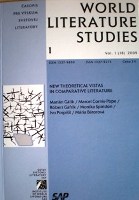The Notion of World Literature and the Definition of Literature in Western and Indian Literary Studies
The Notion of World Literature and the Definition of Literature in Western and Indian Literary Studies
Author(s): Róbert GáfrikSubject(s): Literary Texts
Published by: SAV - Slovenská akadémia vied - Ústav svetovej literatúry
Keywords: Svetová literatúra. Definícia literatúry. Teória medziliterárnosti. Štrukturalizmus; Dionýz Ďurišin; Komparatívna poetika; Sanskrtská poetika; Literárna história; Eurocentrizmus
Summary/Abstract: The notion of ‘world literature’ is inseparably related to comparative literature. However, the relationship between the two is ambiguous and explained in different ways. Indeed, an understanding of the first term demands a definition of comparative literature itself. Apart from Goethe’s understanding of the term world literature,2 a definition that started the debate, two views have gained general recognition. The first is the additive concept that views world literature as the sum of all (national, or individual) literatures of the world. The second view is a selective one that takes world literature to mean the world’s classics, or ‘peak works’ that are read across temporal, cultural and linguistic borders in which they were produced and become the universal heritage of humanity. The term world literature has a significant position in Slovak comparative literary studies, especially so in the work of Dionyz Ďurišin. The term was present in his writings from the beginnings of his involvement with comparative literature, but it was only from the mid-1980s that he made it one of the essential terms of his theory of interliterariness. The Slovak school of comparative literature studies formed in the 1940s, with Karol Rosenbaum, Milan Pišut, and Mikulaš Bakoš considered as its founders. Mikulaš Bakoš took over the project of historical poetics of the Russian literary scholar, Alexander Veselovskij, which demanded ‘the explanation of the essence of poetry from its history’. Veselovskij tried to come to a theory of literature by an examination of its history. In his opinion, literature can be better understood by history than by aesthetics. Mikulaš Bakoš enriched Veselovskij’s thoughts by examining period styles and genres in trying to understand the development of literature.
Journal: World Literature Studies
- Issue Year: I/2009
- Issue No: 1
- Page Range: 28-42
- Page Count: 15
- Language: English

